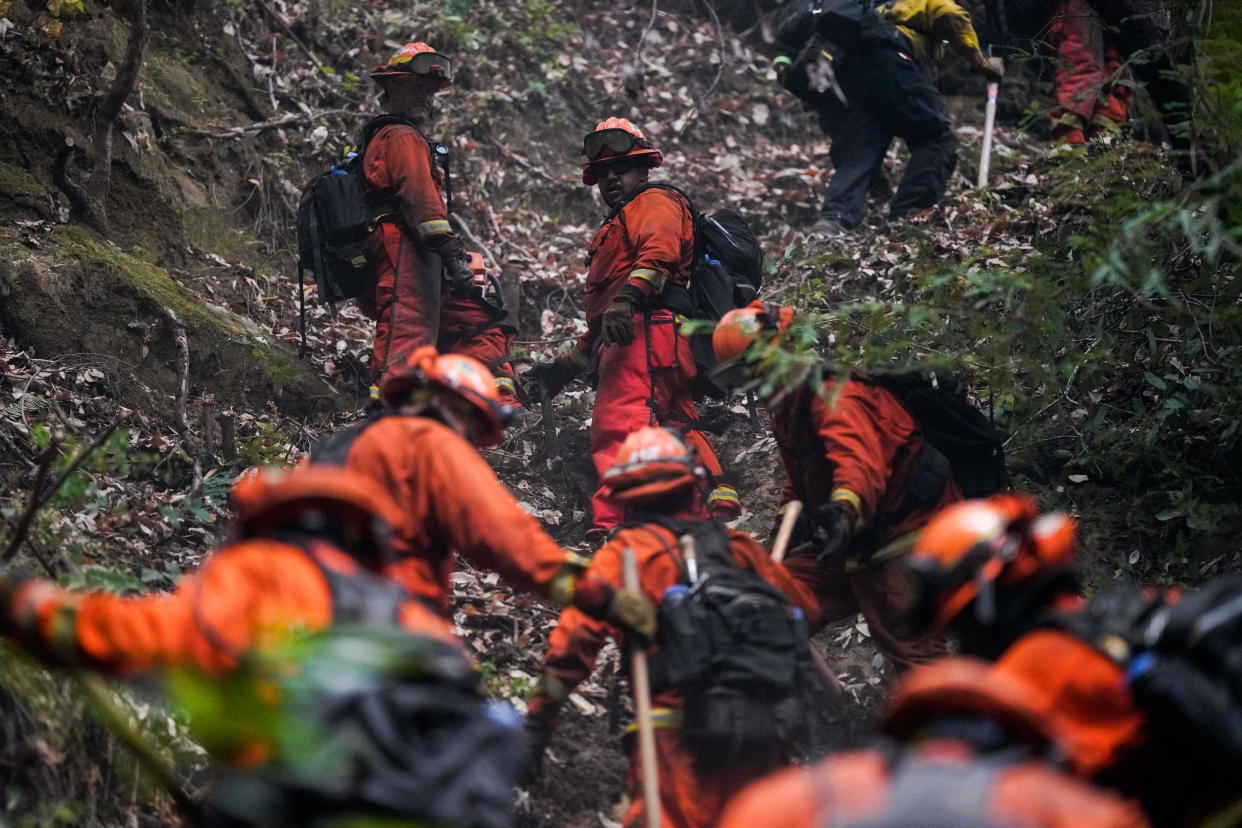California relies on inmate fire crews who compare the dangerous job to 'slave work'
California Gov. Gavin Newsom declared a state of emergency last week after 12,000 lightning strikes over the last two weeks started more than 650 fires in the state. In total, there are now more than 14,000 firefighters struggling to battle roughly 7,000 blazes in California, according to Cal Fire, many working 24-hour shifts.
Among those pushed to the limit as an area the size of Delaware continues to burn are approximately 3,100 inmates trained as wildland firefighters.
“[They] are deployed for several assignments on fires, depending on the need of a particular fire,” Cal Fire spokeswoman Christine McMorrow said in an email exchange with Yahoo News. “They may build a fire line by hand using chainsaws and hand tools both in advance of a fire and as an initial attack. In some cases, they do structure protection.”
Inmate fire crews save California taxpayers $100 million a year, but two former crew members who fought big fires while serving time said their experience made them feel devalued and underappreciated.
Michael Thomas, 27, who was trained at the Cuesta Conservation Fire Camp in San Luis Obispo, Calif., was part of the inmate fire crew from 2018 to 2019, and said inmates risked their lives on those fires in hopes of getting their sentences reduced.
“It was a crazy experience for me, because when they give you an option to go to fire camp it gives you a percentage off your time,” Thomas said in an interview with Yahoo News. “If I’m doing five years, I can get my time knocked in half just by being on the fire squad. … So that’s why people are really risking their lives to do that.”

Thomas fought fires for 11 months while incarcerated for armed robbery. As part of the fire camp, he received eight months off his three-year sentence, which he was serving at California Men’s Colony, a male-only state prison. He earned $1 a day when he was not actively fighting a fire and $2 a day when he was. Working conditions were, Thomas said, less than ideal, often making him feel like a “slave.”
“We would be out on these fires sometimes for eight hours [or] for weeks at a time or months,” he said. “Then the food we’re getting when we’re out on the fires all day would be peanut butter and jelly. It’s like something you would give to, like, an elementary school kid. They expect us to just be OK with that. We’re firefighters. We’re spending all of our energy and time and would come back exhausted, and all they would give us was a peanut butter and jelly sandwich. The slave work and labor was not worth what I went through.”
McMorrow takes issue with that assessment, saying that no inmate has to be a part of the fire camp if they don’t want to. “This is a voluntary program that inmates choose to do,” she said. “After they have entered the program, they are not obligated to stay in this program. They can choose to go back to prison and engage in a different job of their choosing at any time.”
Francis Lopez, 28, told Yahoo News that though he was trained to fight fires while incarcerated at the Konocti Conservation Camp after serving time at Susanville State Prison and San Quentin State Prison for armed robbery, he wasn’t offered a reduction in his two-year sentence. Yet he still chose to be a part of the program, and from 2015 to 2017 he helped put out fires all over Northern California.
“It kind of gave me a sense of purpose to be able to impact the world positively in the lowest point of my life,” Lopez said. “Going through the experience for me was more of a self journey, because you were able to see the work that you put in, and it was a crazy dynamic because on one side you still are incarcerated, but on the other side you’re literally saving people’s homes, saving lives, saving whole communities.”

For all the self-esteem that fighting fires offered him, though, Lopez questions the lack of compensation.
Due to the inherent risk of the profession, firefighters in California can make a six-figure salary with excellent benefits. Lopez said he talked to Cal Fire workers who said they made $60,000 to $70,000 fighting fires during the summer months alone. But many inmate firefighters came out of prison without much to show for their work.
“The work was strenuous,” Lopez said. “We didn’t get paid much, and even if you do get paid ... restitution still comes out of that. So you’re working your your ass off and really not getting compensated for it.”
While there are programs set up to transition inmate firefighters into city firefighters, both Lopez and Thomas said it’s next to impossible to make it happen.
“If you’re a felon, you can’t apply to be a city firefighter at all,” Lopez said. “I came home to a daughter, so I just had to get the bag right away. ... I had no problem with it. I really liked to work, and I was actually really good at what I did, but there are no resources. I feel like the least they could do is set up people with interviews. We went through this program, we did all of this for communities. They’re thanking us for being heroes and all of this, but when we get out, we’re just felons.”
State activists believe it’s troubling for California politicians to say they are committed to the rehabilitation of inmates without helping those who have risked their lives battling wildfires.
“It’s OK to exploit the labor of incarcerated firefighters and incarcerated people at slave wages, but once you are released and you’ve paid your debt to society, as they say, and you have this really high-level skill to a fight a wildland fire … you can’t do that,” Romarilyn Ralston of Project Rebound, a California State University program that supports those who — like her — were once incarcerated, told the Sacramento Bee last month.

A bill put forth this year by Assemblywoman Eloise Gómez Reyes would allow inmate firefighters to have an easier path at having their records expunged. The bill has passed the Assembly and is pending in the California Senate.
Keeping inmate firefighters safe is another big concern for Lopez, who had a pregnant girlfriend at home awaiting his return when he was on the frontlines.
“I didn’t feel safe at all, to keep it real,” he said. “There were times I thought it was going to be over.”
As climate change has extended fire season each year, inmate firefighter camps across California seem to be up against the impossible as wildfires ravage the state. And the inmates aren’t the only ones feeling the stress.
Lopez’s girlfriend, Dayana Contreras, posted this photo of Lopez during his time fighting fires while incarcerated. She added the caption, “My partner was an inmate firefighter for most of his sentence. ... Inmate firefighters are frontline, but we don’t get shown these images. Thank you to ALL firefighters out there.”
My partner was an inmate firefighter for most of his sentence. Was paid $3 a day. Loved the work. It was extremely dangerous but said it made him feel productive. Inmate firefighters are frontline, but we don’t get shown these images. Thank you to ALL firefighters out there. pic.twitter.com/fFTPHAZQJv
— Dayana Jiselle (@DayanaJiselle) August 20, 2020
Contreras said she dealt with the anxiety of going long stretches without hearing from Lopez by consoling herself with the knowledge that her boyfriend was risking his life to help others.
“The only reason that I got myself to be OK with [knowing he was fighting fires] was because I saw what it was doing for him mentally and how it was helping him,” Contreras said. “He’d go weeks without contacting me because he’s out on fires. So I could have had an ultrasound or I could have an update with my pregnancy and I had to wait days at a time, if not weeks, to let him know.”
Contreras added that she felt compelled to post the tweet about Lopez for all the people who have loved ones fighting California fires right now.
“Realistically, if we’re putting value on lives, I understood that the inmates’ lives are less valuable than those of the officials,” she said. “Just living with that every day was a little torture. I was just compelled to post a tweet and kind of give a shout-out to anyone out there that maybe has a family member or a loved one out there right now, just to let them know that they’re appreciated.”

Today, Thomas is a freelance photographer with a clothing line called Cash Addicts that is set to launch soon. Lopez, meanwhile, works with two nonprofit agencies that help young people who are caught up in the juvenile justice system. As a hobby, he’s also a rap artist who goes by the name of P.Smoov. Contreras supports all his endeavors.
Still, with California once more on fire, she thinks about the inmates who are out risking their lives to save other people’s property.
“Oftentimes, they’re not seen,” Contreras said. “They’re not heard — the invisible workers.”
_____
Read more from Yahoo News:

